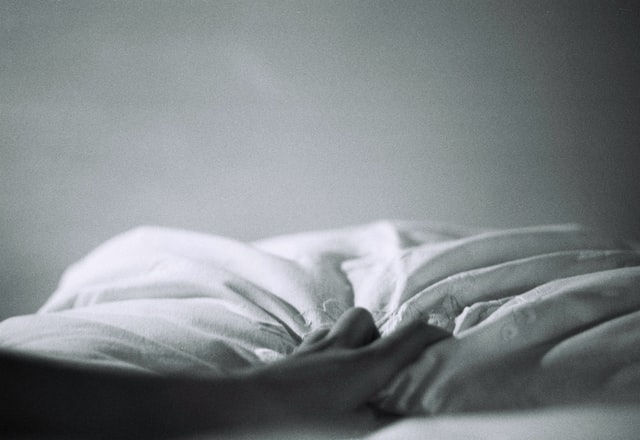There are many reasons why people have trouble sleeping. Insomnia is a sleep disorder that affects people of all ages and genders, but it is most commonly caused by a health condition.
One common reason why someone may have trouble sleeping is stress. Stress leads to poor sleep habits, which then leads to more stress and can worsen insomnia symptoms.
Another health condition that causes insomnia is certain medications or substances, such as caffeine or nicotine use. Other causes of insomnia are sleep apnea, restless leg syndrome, and anxiety disorders.
Let’s see what health conditions can cause insomnia!
What is insomnia?
Insomnia is a sleep disorder that lasts from 1 night to a few weeks, and it affects more than 200 million Americans. It can happen as an acute or chronic issue and affects people differently depending on the severity of their insomnia, such as how it affects work performance, relationships with others, and overall mental health.
It occurs when someone has trouble sleeping or wakes up feeling tired and unable to sleep again for days.
It is a symptom of many health conditions, and it is essential to note that insomnia isn’t a diagnosis or disease, so it can be challenging to determine the cause.
This condition makes it difficult to do routine tasks. It can be chronic or long-term, and the severity of insomnia has no set length.
It’s no surprise to learn that one in three adults has bouts of insomnia for less than two weeks at a time.
What are the different types of insomnia?
Primary insomnia is a disorder that can be caused by anything from stress, depression, or anxiety to drugs and alcohol. It’s not the result of another medical condition like sleep apnea or narcolepsy.
Secondary insomnia is caused by or happens alongside other health conditions or as a side effect of prescribed medicines that can cause it.
For example, most people with chronic insomnia also experience secondary insomnia. This is when you’re unable to sleep well due either to triggers or uncontrollable thoughts that keep coming into your head.
It’s vital for these individuals not only to get proper treatment but also to find ways to manage their stress and emotions so as not to fall victim again to this debilitating condition.
There are many different types of insomnia, but the most common type is sleep-onset insomnia. This occurs when people wake up in the middle of the night to feel that they cannot fall back asleep again. Insomnia can be caused by anxiety or depression, which leads to poor quality sleep and increased risk for health complications like hypertension, diabetes, obesity, heart disease, etc.
The symptoms vary among individuals depending on what’s causing them, so it’s essential to know if you’re experiencing any of these symptoms.
Acute insomnia
There are three types of insomnia: acute, chronic, and onset. Acute insomnia is short-term and seen as a temporary condition that can last from a few days to a few weeks.
Compared to chronic insomnia, acute insomnia is more common and lasts for a shorter period of time. Acute Insomnia can be caused by traumatic events like the death of a loved one or starting a new job; however, it also occurs when you experience stress from other things such as an argument with your partner.
Chronic insomnia
If you have trouble sleeping for at least three days a week for one month, it is considered chronic. Chronic insomnia is when a person doesn’t sleep for an extended period of time. It can last anywhere from 3 months to years, and it’s not uncommon in people with depression, anxiety disorders, and other chronic illnesses.
People may also experience poor sleep because of medication or drinking alcohol while trying to fall asleep.
The symptoms of chronic insomnia vary, but there are three most common signs: oversleeping, trouble falling asleep at night, and early morning awakening. This condition is typically caused by medical conditions like depression or jet lag.
Onset insomnia
Onset insomnia is short-term or chronic, and it is often caused by psychological or psychiatric issues. Onset insomnia is a sleep disorder characterized by difficulty falling asleep and staying asleep through the night.
Onset insomnia is usually caused by an underlying medical condition, such as depression or stress. There are many ways that people can alleviate their symptoms of onset insomnia.
People with chronic onset insomnia have another sleep disorder, such as restless leg syndrome or periodic limb movement disorder. This is because the brain changes in these people’s brains during their sleeping patterns to try and prevent them from dreaming, which leads to restlessness when they are asleep at night.
Onset insomnia is not just a side effect of caffeine but also other stimulants like nicotine and alcohol. When people are trying to fall asleep, they drink coffee or smoke cigarettes to stay awake longer, which causes their body’s natural sleep-inducing hormone melatonin levels to go down too much for them to be able.
What health conditions cause insomnia?

The causes of insomnia vary, but it often results from chronic conditions such as depression, anxiety disorder (such as obsessive-compulsive disorder), substance abuse disorders like alcoholism and drug addiction, posttraumatic stress disorder (PTSD) caused by events like car accidents or wars — even pregnancy can cause sleeplessness in some women.
Medical conditions such as diabetes and heart disease may also contribute to insomnia by causing pain, difficulty concentrating, or other symptoms that make it difficult to sleep.
Chronic physical conditions
There are a variety of physical conditions that may lead to insomnia. Chronic health conditions such as sleep apnea, restless legs syndrome, narcolepsy, and night terrors can cause insomnia due to the underlying condition.
Chronic physical conditions can often cause sleep problems. For example, hormonal changes during pregnancy and other medical conditions such as Parkinson’s disease may cause sleep difficulties in the patient.
The presence of chronic physical conditions, such as diabetes or other neurological disorders, has been found to lead to sleep difficulties. This is because the disease affects various physiological systems that are involved in regulating sleep-wake cycles.
Mental health disorders
Mental health disorders are a leading cause of insomnia, and 40% of people with insomnia have a mental health disorder.
Mental health disorders such as depression and anxiety can affect sleep, especially chronic insomnia. This is because mental hyperarousal disturbs the body’s natural rhythm of rest and wakefulness. Studies indicate that those who suffer from these mood or anxiety disorders are more likely to have worse outcomes when they don’t get enough quality sleep time.
Heartburn
Heartburn is a symptom of gastroesophageal reflux disease (GERD) or heartburn, which is the regurgitation of stomach acid into the esophagus. It is also known as acid indigestion or sour stomach.
Heartburn is the name given to the burning feeling in your chest that you get with an upset stomach. The main symptom of heartburn is a burning sensation or pain on one side of your upper abdomen or back. It can also be caused by many other conditions, such as acid reflux disease and GERD (gastroesophageal reflux disease).
Heartburn is known to affect sleeping patterns, so it can lead to insomnia if left untreated.
General anxiety
General anxiety is a feeling of nervousness that does not have any direction or focus. Common symptoms include trouble sleeping and not being refreshed after an adequate sleep period.
The leading causes for these feelings are external factors such as stress, work, relationships, etc. Most adults have experienced some difficulty sleeping because they feel worried or anxious about something in their lives.
General anxiety may affect the individual’s concentration, work performance, social life, and general well-being, and it’s been associated with onset insomnia.
General anxiety is not a disorder. However, it can be so severe that people with prevalent anxiety experience insomnia and an inability to sleep properly.
Phobias and panic attacks
Some of the most common health conditions that cause insomnia are phobias and panic attacks. Phobias and panic attacks can often occur at night, which is why it’s essential to recognize the underlying problem.
In some cases, treating the root cause may solve a person’s sleep disturbance.
Many people have phobias that are related to panic, which causes their bodies to produce adrenaline. When a person has an anxiety disorder, they may also experience insomnia and other symptoms of mental illness.
Depression
Depression is a mental disorder that affects how people think, feel, and behave, and almost 90% of people with significant depression experience insomnia. It is crucial for a physician evaluating someone with insomnia to consider the possibility that it is caused by depression. Waking up too early in the morning indicates significant depression, and this symptom should not be ignored when considering sleep problems.
There are some symptoms of depression which include difficulty falling asleep or getting fitful sleep throughout the whole night risk of severe insomnia is much higher in patients with major depressive disorders.
Symptoms such as low energy and loss of interest or motivation can be linked with insomnia. One makes the other worse in some cases, but both are treatable with medication and counseling treatments.
Types of medication for insomnia

Medications can help people with insomnia, and many people take medications to treat their insomnia, including psychiatric medicines such as antidepressants and antipsychotics. However, some medications are not recommended because they could worsen the underlying health condition causing insomnia.
Additionally, the types of medication for insomnia are numerous. From over-the-counter drugs to prescription medications, there are many options available that can help individuals with chronic problems.
Some common side effects of prescription and over-the-counter (OTC) sleep aids include drowsiness, dizziness, headache, dry mouth or throat irritation, and difficulty urinating.
Many OTC medicines contain antihistamines that are usually used to treat allergies. These medications will not help with sleep onset because they do not affect the brain’s wake-sleep cycle.
Furthermore, many of these medications have warnings and potential side effects, so patients need to ask their doctor or pharmacist about warning signs and possible side effects before taking them.
It is also essential for patients to take only the amount of medicine suggested by their doctor as this can vary from person to person.
As a result, insomnia is seen as an issue of sleeplessness and one that can cause problems in day-to-day life.
FAQ
Causes of insomnia in elderly
Insomnia in older adults is caused by several different conditions, including illness, age-related cognitive decline, and hormonal changes. People over 60 have less efficiency in sleep due to the decreased daylight exposure and environmental cues for rest.
It is common for older adults to experience sleep disturbances that last up to two years or longer.
What are the causes of insomnia in teens?
Biological changes in adolescents push them towards a later night owl sleep schedule. 8% of teens suffer from insomnia. Teens may be especially susceptible to overscheduling and stress from school, work, and social obligations, contributing to their insomnia.
What are the causes of insomnia during pregnancy?
There are many causes of insomnia during pregnancy. Weight gain and body composition changes can cause discomfort in bed, while hormonal changes increase snoring and central sleep apnea risk. Greater urinary frequency creates nocturia.
Pregnant women have a greater risk of restless leg syndrome (RLS), even if they have never experienced symptoms before. Furthermore, people with RLS experience insomnia or sleep problems during pregnancy that can cause poor quality of life and affect the mother-to-be’s health.
In the first trimester, pregnant women’s sleep quality decreases as they sleep more hours, while the third trimester is when the most significant sleeping problems occur for pregnant women.
What part of the brain is linked to insomnia?
The part of the brain linked to insomnia is the prefrontal cortex, which plays a role in self-regulation and memory. Recent medical studies discovered that sleep deprivation results in increased emotional reactions because the amygdala becomes up to 60% more active than usual. Sleep deprivation also altered the link between the amygdala and the medial prefrontal cortex, which influences amygdala function.
Can a neurologist diagnose insomnia?
Yes, a neurologist can diagnose insomnia. Sleep disorders can have a variety of causes, including medical conditions.
There is no specific test for insomnia, but the doctor will do a physical exam and ask questions to learn more about your sleep problems. Your doctor may also order blood tests if they suspect a medical condition may be causing your insomnia.
Final thoughts
Insomnia is a nasty condition that plagues many people. The good thing is that it’s treatable, and if you suspect you have it, you should consult your doctor as soon as possible.
There are many ways to treat insomnia other than conventional methods (drugs, etc.), but we’ll discuss that in our following articles.
Feel free to let us know if you’ve successfully treated your insomnia and how you did it in the comments below!




